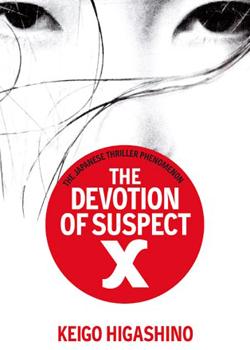The Devotion of Suspect X

By Keigo Higashino
Translated by Alexander O. Smith with Elye J. Alexander
Abacus (2011)
Originally published in 2005
440 pages
ISBN: 0349123748
Review by Michael Sullivan
Keigo Higashino [東野 圭吾] was born in Osaka in 1958. In 2006 he won the 134th Naoki Prize and the 6th Honkaku Mystery Grand Prize for his novel, The Devotion of Suspect X, which had been published the previous year. He has been writing since 1985 and has had numerous books, essays and children’s stories published, many of which have been adapted for TV dramas and movies. In 2008 the movie of The Devotion of Suspect X was released, it was directed by Hiroshi Nishitani [西谷弘] and starred Shinichi Tsutsumi [堤真一] and Yasuko Matsuyuki [松雪 泰子]. This was the third highest grossing film of 2008 and featured the continuation of the same characters (and actors) from the 2007 TV drama Galileo [ガリレオ], which was also based on another book by Keigo Higashino.
Tetsuya Ishigami is a teacher, regarded as a mathematical genius in his school years he now teaches unmotivated school kids while living a very simple life. He has an unrequited infatuation with his neighbour, but as no one seems to notice, and he isn’t willing to pursue it, it remains relatively innocent. His neighbour Yasuko Hanaoka is a single mother living with her teenage daughter Misato, after having moved several times to escape from an abusive ex-husband. Having previously worked as a hostess, she now works at a local bento shop. However, her ex husband, Shinji Togashi, isn’t finished with her and he manages to track her down, demanding money he forces his way into her flat and, fearing for her daughter, Yasuko does the unthinkable. In the aftermath she and her daughter are left staring down at the dead body of Shinji when suddenly someone knocks on the door. Her neighbour, Tetsuya, has guessed what has happened and ignoring Yasuko’s denials he proposes an audacious plan to cover up the murder. Little does she know that in his head he can calculate the most likely odds of how the detectives will investigate and the probable outcome.
Shunpei Kusanagi is assigned to a new case, a mutilated dead body has been found by the river, the man’s clothes have been partially burnt and a bicycle abandoned nearby. Enough clues are found to allow them to find the man’s hotel room and figure out that they have discovered the body of Shinji Togashi. They soon learn that Shinji was looking for his wife and consequently check into her alibi, it turns out that on the evening when Shinji died Yasuko and Misato had been to the cinema and to karaoke, furthermore they state that they haven’t seen Shinji for a long time. The alibis seem rock solid, they are even backed up by solid evidence at the cinema and karaoke shop, but something bothers Shunpei and he soon winds up speaking to his friend Manabu Yukawa, a physics professor, about this latest case. The story is given a further twist when it turns out that Manabu and Tetsuya were at university together, driven by his own curiosity and a wish for a reunion they meet for the first time in years. However, Manabu is prompted by his own suspicions to investigate further the connection between Tetsuya and Yasuko.
Meanwhile, Yasuko meets up with an old friend who is now a widower, and with whom a romantic spark flares up. Ever watchful Tetsuya notices this and his actions become decidedly sinister. At this point the tempo of the story quickens as Shunpei’s and Manabu’s separate investigations exert pressure on Yasuko and Tetsuya. However, it starts to become unclear whether they are following the clues that they find or that they are purposely being fed them. The second half of the story is very thought provoking and the reader is forced to become engrossed in the story. The author has a persuasive voice making the audience feel they know what has happened and who is lying while through the actions of Shunpei and Manabu making the reader slowly doubt they know how the crime was covered up, and more importantly know which crime was actually committed. Although the author could have focused a little more on the dilemma faced by women with abusive ex-partners, he still portrays Yasuko and her daughter compassionately while a clever twist in the story reveals that they aren’t lying about their alibi.

